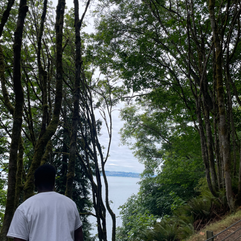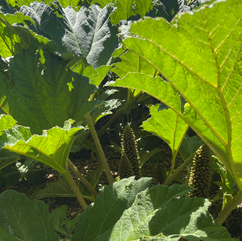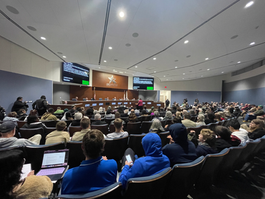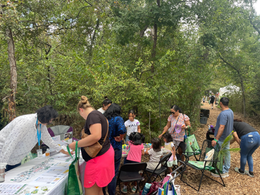"To be able to breathe fresh air" - Parting reflections from a year of grassroots organizing
- Chioma Ugwonali
- Aug 1, 2025
- 4 min read
Chioma Ugwonali
Outgoing Community Engagement and Partnerships Coordinator, Liveable Arlington
1 August 2025
Recently, I got to visit Tacoma, Washington where I strolled along piers bordering the Puget Sound; kayaked with my youngest brother; admired the birds, jellyfish, slugs, deer, and other inhabitants of the Pacific Northwest; and ventured through old-growth forests.
What I first noticed– prior to the waterfront walks and colorful mosaic of flora and fauna– was the clean air, not just in Tacoma but across the bustling Seattle-Tacoma metroplex. My grandmother did not wake up with blurry eyes from “allergies” as she usually does in her home in East Fort Worth and my brother did not tire as easily as he sprinted up steep inclines during our hikes. Unlike at home in Texas, I felt no resistance to breathing in and out– an action that should normally be unconscious and unencumbered. Perhaps it was the slightly cooler temperature, the reduced humidity, or the ocean breeze, but I am strongly convinced that the lack of proximity to polluting infrastructure, such as fracking sites and compressor stations, afforded me the luxury to breathe fresh air.
Unsurprisingly, the American Lung Association gives Pierce County, which includes Tacoma, a passing grade in annual particulate pollution and an “A” in annual ozone pollution. Tarrant County, in comparison, has a failing grade in annual particulate pollution and has received the lowest possible grade in annual ozone pollution for the past thirty years. (This analysis from the ALA corresponds with my experience being in the two counties. Notably, scientific results often don’t mobilize people to advocate for environmental health [clean air, clean water, healthy soil, etc.], until they can feel, or in my case, breathe, the difference themselves. We see this as more people realize that climate change is indeed real through the felt impacts of flooding, wildfires, extreme heat, and other not-so-natural disasters). There is no doubt that the local fracking industry, which includes hundreds of “natural” gas wells next to homes, schools, parks, and playgrounds, plays a major role in the poor air quality across Tarrant County.
The entire lifecycle of fossil fuel use– from extraction to combustion– generates toxic emissions of carbon dioxide, methane, nitric oxides, particulate matter (ex. PM2.5), and volatile organic compounds as well as creation of ground-level ozone, or smog. In the past, health effects resulting from these emissions have been difficult to track due to challenges with data collection, reporting, and documentation of the complex interactions between pollutants and biological systems. However, the scientific community has made considerable strides in elucidating the connections between fossil fuel pollution and health. Researchers have found that fossil fuel use, particularly long-term exposure to fine particulate pollution and ozone, results in an estimated 8.34 million excess deaths annually worldwide.
It is truly a privilege to be able to experience what it feels like to breathe minimally polluted air. I think about people around the world, particularly those living in urban centers, whose normal air pollution levels far exceeds the threshold for “safe” levels of critical air pollutants. Sadly, with the recent decision of the Trump administration to dissolve the scientific research capacity of the Environmental Protection Agency, much of this data in the U.S., and its consequent impacts on human health, will be concealed– hindering already obstinate policymakers from taking action to improve air quality.
Though disappointed by the decisions of elected officials at every level of governance to jeopardize the health and well-being of us all and the myriad of other factors that accelerate the environmental crisis, I am not defeated. I am so grateful to have been able to participate in advocacy upstream of fossil fuel use, in my hometown nonetheless. Growing up, I remember noticing the changing land use throughout my neighborhood– I always wondered what those “construction cranes” and towering fences were for. Thanks to Liveable Arlington, I now recognize these structures as drilling or workover rigs and the associated, unassuming walls that represent the determent of public curiosity and accountability.
The advocacy of Liveable Arlington and thousands of other organizations and people around the world has slowed down the extraction and use of fossil fuels, thereby protecting thousands, if not millions, of lives. Thank you, reader, for participating in this movement for environmental and climate justice. Even if we have never met, it has been a pleasure to co-imagine and collaboratively work towards a more liveable future for all.
In conclusion, I encourage you to share your story of interacting with the world around you with a family member, friend, or colleague. What have you noticed about your environment that has changed over the years? What are you grateful for and what brings you joy? In this time of intentionally-cultivated division, disinformation, and fearmongering, we need reminders of our shared humanity and interdependence with the global ecosystem.
With peace,
Chioma Ugwonali
M.D. Candidate, University of California San Diego School of Medicine
Note: Artificial intelligence was not used in the writing of this blog post. Each generative AI query requires about five times as much electricity use as a simple search. Companies often turn to gas and coal-powered plants to meet the energy demands of the data centers that train and process AI. Moreover, the amount of water needed to cool these data centers siphon critical water sources away from local communities and ecosystems.
If you know of opportunities to collaborate with research or advocacy efforts at the intersection of environmental justice and human health, please let me know. I want to keep planetary health at the forefront of my medical education and future practice. You can contact me at cugwonali@ucsd.edu.
These thoughts are my own and do not reflect the views of Liveable Arlington.





























































Comments